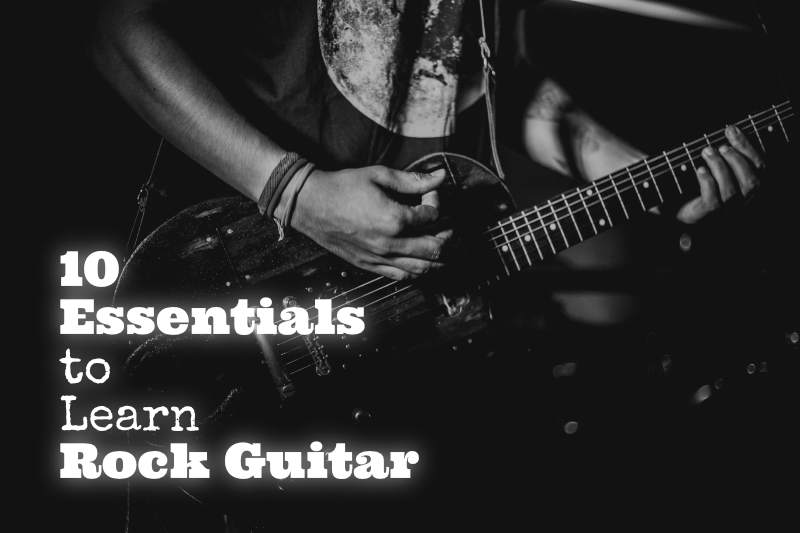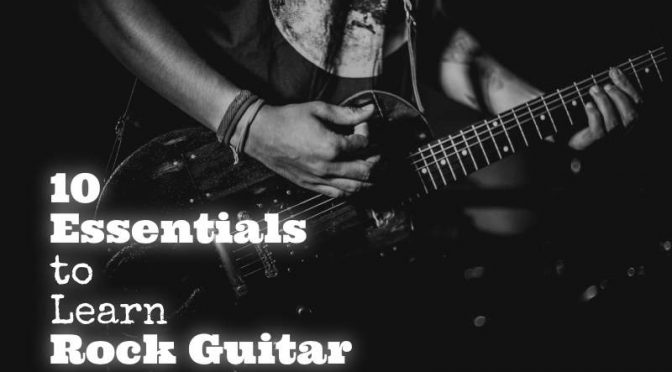Last Updated on May 30, 2020 by Klaus Crow

Rock guitar has an irresistible attractive force to guitar players . The dopamine that releases from strumming power chords that are heavily distorted or conquering a great rock solo while playing it along with the original song, a jam track or with a real band gives you that primal, powerful, and godlike blissful feeling all at the same time.
There is an abundance of creativity in rock music and there are so many different styles, genres and techniques, you can dedicate your whole life time learning rock guitar, but if you know two power chords you’re in the game.
It’s an endless source of fun and inspiration you can indulge in. So what do you need to know to learn rock guitar? What is essential to study and master to become a real rock guitar player?
Here are the keys:
1 – Power chords
Power chords are rock chords that you need in order to play rock songs. They are your basic building tools for rhythm rock guitar and super useful when it comes to playing with distortion. Power chords give you control over your distorted sound without turning it into noise and going all over the place. You do this by playing only the root and fifth note of the major scale. Power chords are fairly easy to play and are great motivator for beginner rock guitar players.
2 – Learn one rock song at a time
This is a no brainer, but by learning to play rock songs you learn to play rock guitar. It’s the songs that make you learn the skill. Learn to listen to the overal song, then just the guitars, the drums, the bass, and the keys. Listen and learn to play it piece by piece. First the intro, then the verse, the chorus, the bridge, etc. Start with easy rock songs and work your way up. Here are some of the best tools to figure out guitar songs and solos. Songs are the key to learning the craft.
3 – Learn rock guitar solos
Rock guitar solos are the best. Just like songs, soloing skills are learned by learning solos and transcribing solos. You start with the easy ones and gradually build your way up to the more challenging ones. You’ve got to take it step by step.
4 – Guitars, amps and pedals
The sound is an important aspect of rock guitar. The use of distortion and overdrive through amps, rock pedals and guitars is the way for rock musicians to create that dirty explosive sound and express their musical creativity. It’s a vital part of rock music. There are many different kinds of distortions and overdrives and depending on your style of music and personal taste you will find through experimenting what sound suits your needs.
5 – Rock licks.
Licks are short melodic ideas, which can seen as the words, phrases and lines that make up part of the story and the style, to bring tension and release, and can be used for your solo. You can string them together or use them as short fills throughout the song. Licks are also used to learn new techniques and soloing approaches. Collect as much cool licks as you can and learn how to express yourself in unlimited musical ways.
6 – Learn riffs
A riff is a short rhythmic, melodic, or harmonic figure / chord progression that is characteristic for the song and often determines the main rock rhythm theme of the song. Most guitar students want to learn the riffs because they are so recognizable and fun to learn. Check out 50 of the Greatest Guitar Riffs to boost up and expand your rock riff vocabulary.
7 – Rock rhythm
A lot of rock rhythm is based on the use of power chords and strumming in eighth note downstrokes, quarters and 16ths. There are many rock songs that use mainly downstroke strumming to create a punchy rhythmic sound, but also a variation of up and down strokes and syncopation is part of the rhythmic spectrum. In a lot of heavy rock and metal you get to deal with advanced rhythm playing which is really good to develop a great sense of rhythmic feel. Again, learn the rock songs and the skill of rock rhythm will develop accordingly.
8 – Start a rock band
Once you’ve got some rock songs under your belt the best thing to do is to start a rock band, if only for the experience and skills you develop. There is so much to learn from playing in a band that you can’t possibly learn on your own. Playing and locking into the groove of the drummer and the bass player, learning songs from start to finish, working out musical details, learning to play steady rhythm and soloing with a band, try lead singing or backing vocals, listening to all the different instruments and the music in different ways, learning with and from your fellow musicians, and the feeling of playing together is all in all priceless.
9 – The Pentatonic / Blues scale
The Pentatonic / Blues scale is THE scale that is used in rock solos and improvisation 90% of the time. This is the scale you want to learn for soloing and improvisation in rock music. It gives you the freedom to express your rock soloing ideas all over the fretboard.
10 – Create a rock practice habit
A steady and regular practice habit is invaluable in becoming an accomplished rock guitar player. Setting up a practice routine that consists of all the various rock guitar elements and skills will keep you focused and on the right path. Making daily progress is the best motivation there is. Plan a fixed time for your guitar practice in your schedule, stick to it, and watch yourself grow as a rock guitar player.
Rock on!
Best,
~ Klaus Crow
